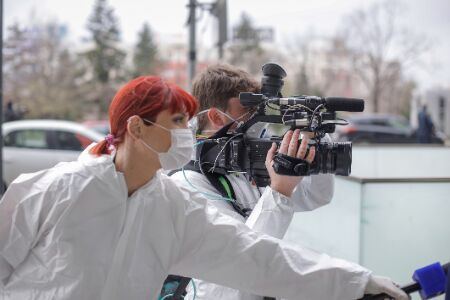At the frontlines

Among the many harrowing tales you hear or don't get to hear on the frontlines of Covid worldwide are the struggles of those bringing you those stories. As society retreated from public life into the relative safety at home, journalists worldwide continued to bring vital stories, tragic stories, even hopeful ones at times. To a journalist, covering COVID-19, besides being a major health hazard, is also a job. There is no real option to retreat as the news cycle must always go on. And they have paid the price for taking these risks as well. The Press Emblem Campaign has noted that worldwide, at least 1,200 journalists have died in the last year as a result of Covid. India is noted to be third on the list with the highest number of journalists dying from COVID-19, behind Peru and Brazil. By the end of April, the toll for Indian journalists stood at 107, with 45 of those coming in just two weeks. This estimate, as with the case of all Covid estimates, is not likely to be the full picture of how widespread the problem actually is. Beyond just a human tragedy, this is tragic for different reasons as well. In India, just as is the case with the world, journalists have been recognised as vital frontline workers. They are permitted to move around even when restrictions are in place. But, unlike other frontline workers, journalists have been left out of the discussion when it comes to priority vaccinations of those working on the frontlines of the pandemic. While many have managed to transition to a more work from home oriented model, not everyone has been quite so lucky. Freelance journalists, reporters and obviously visual journalists are even more at risk because their work generally precludes them from safely sheltering in place. The risks for journalists in such times come from many different avenues. To begin with, many have not had adequate equipment to protect themselves when going out onto the Covid frontlines. This was especially the case last year when there was a scramble to secure PPEs, sanitisers, etc. As coverage of the pandemic requires a dangerous level of contact with the contagion, ordinary precautions — wearing a mask, safe social distancing, sanitation, etc. — are sometimes not enough. Sure, you could get yourself that extra mask, a face visor, etc. But then the list of precautions never end and even then, there is simply no guarantee of safety when you expose yourself to the virus every single day at such an intimate range. And this is not all. There were several cases of journalists last year facing the same kind of harassment as other frontline workers as they were perceived to be tainted carriers of the disease. Death threats, attempts at eviction, etc., are all additional tragedies that many journalists experienced as they strived to keep society informed in its darkest hour. Taken together with the compounding toll of job and income insecurity, family tragedies and other such uncertainties, the mixture becomes a toxic one indeed. But what can be done? The news must go on. But this is not to say that nothing can be done to alleviate the risk that is taken on by frontline journalists. Vaccines are the key to helping us end this pandemic, it is also the key to keeping our frontline workers relatively safe. This is precisely what many in India and across the world are demanding. Recognise journalists as true frontline workers and give them priority inoculations so that they make continue their vital work without playing a game of Russian roulette every time they go to work. Organisations such as the Editors Guild of India have been urging the government to give priority vaccines to journalists for some time. But journalists have not yet been added to the national list of priority vaccinations for frontline workers. But though the Centre has kept its silence regarding the matter, thankfully, a few of those in power have spoken up. The Indian states of Madhya Pradesh, Bihar and Odisha have recently declared journalists to be vital frontline workers. Uttarakhand too had previously made such a declaration. Odisha not only announced that journalists would be inoculated as frontline workers but also went further by announcing an ex gratia amount of Rs 15 lakh for the next of kin of journalists who died of Covid in the line of duty. This is a hopeful start and possibly one that could and absolutely evolve into a much larger movement to recognise the on-job risks and sacrifices of journalists who expose themselves to danger every day.



